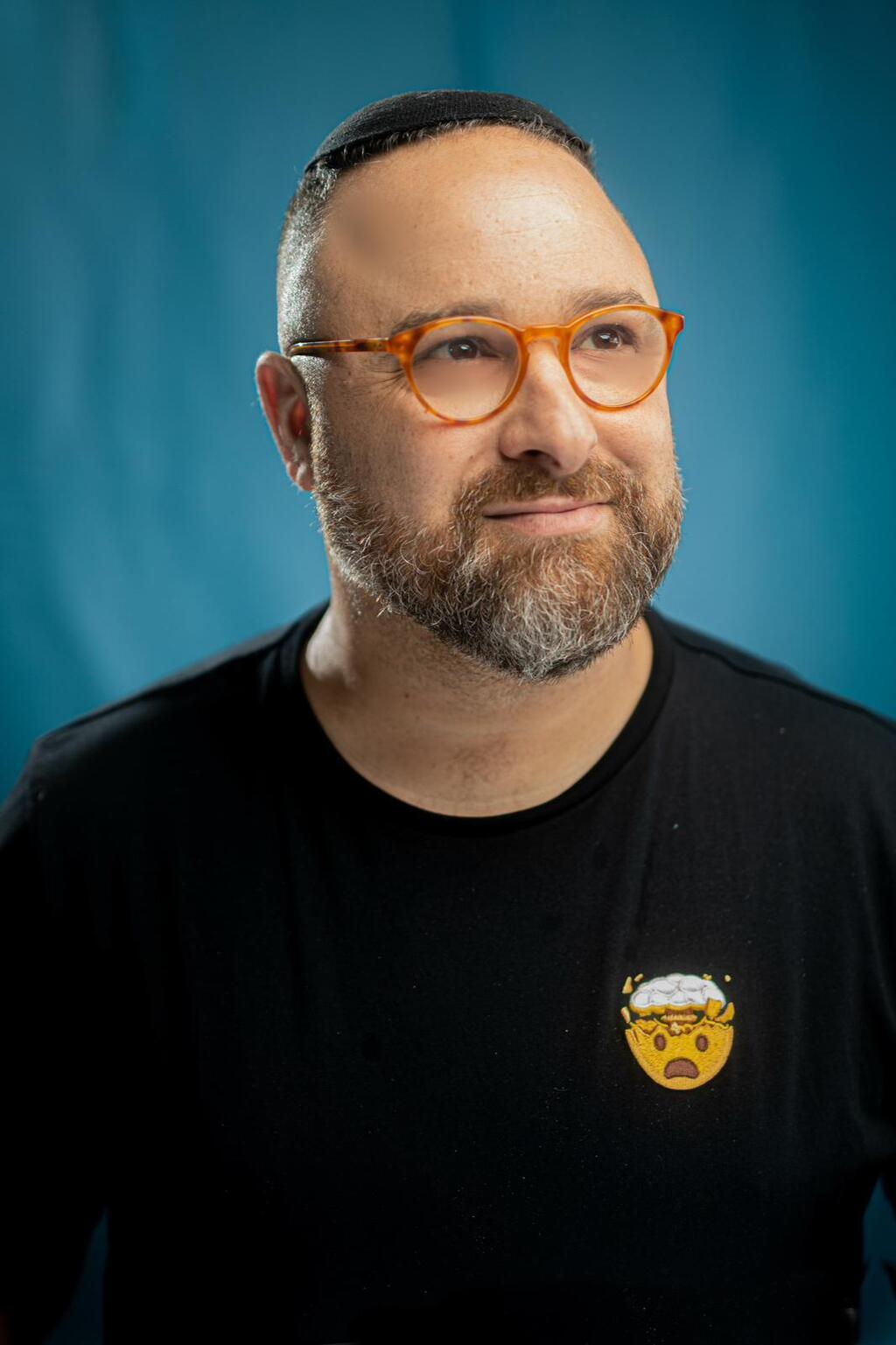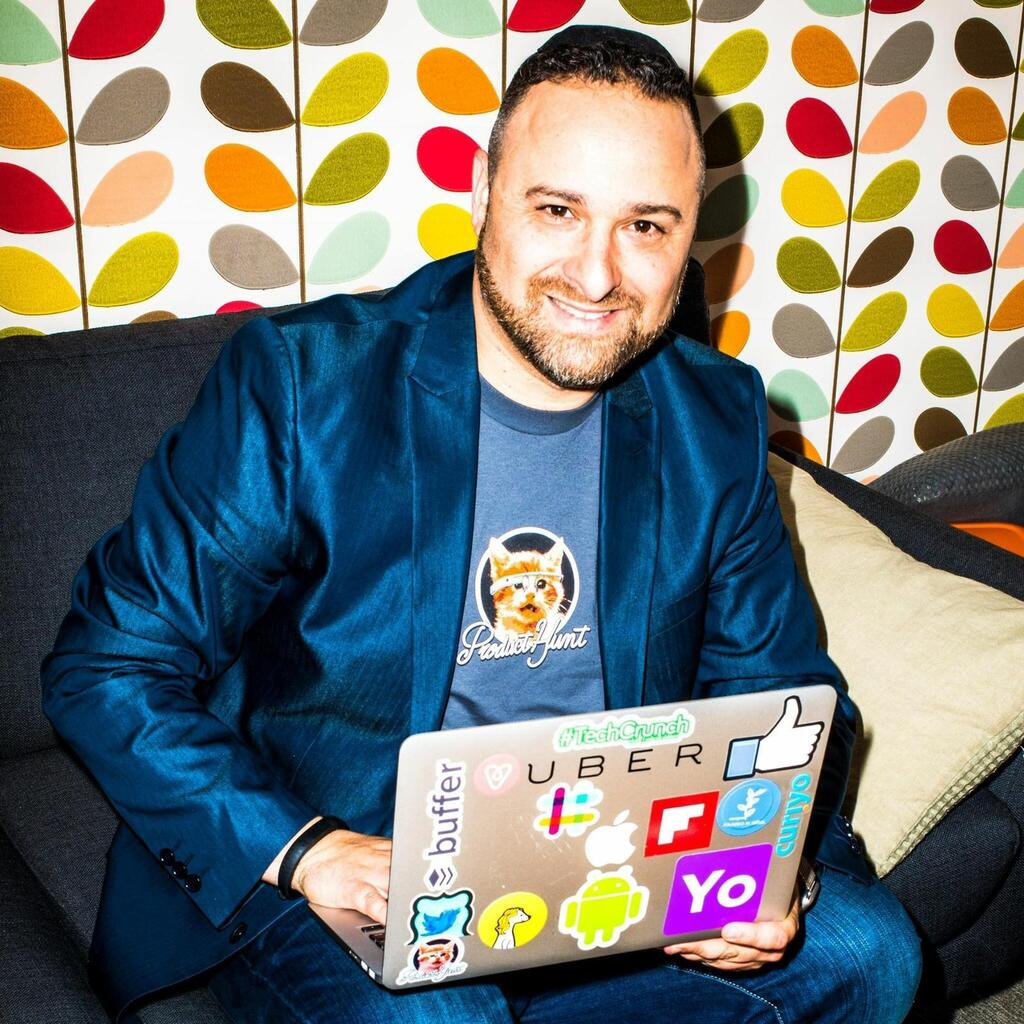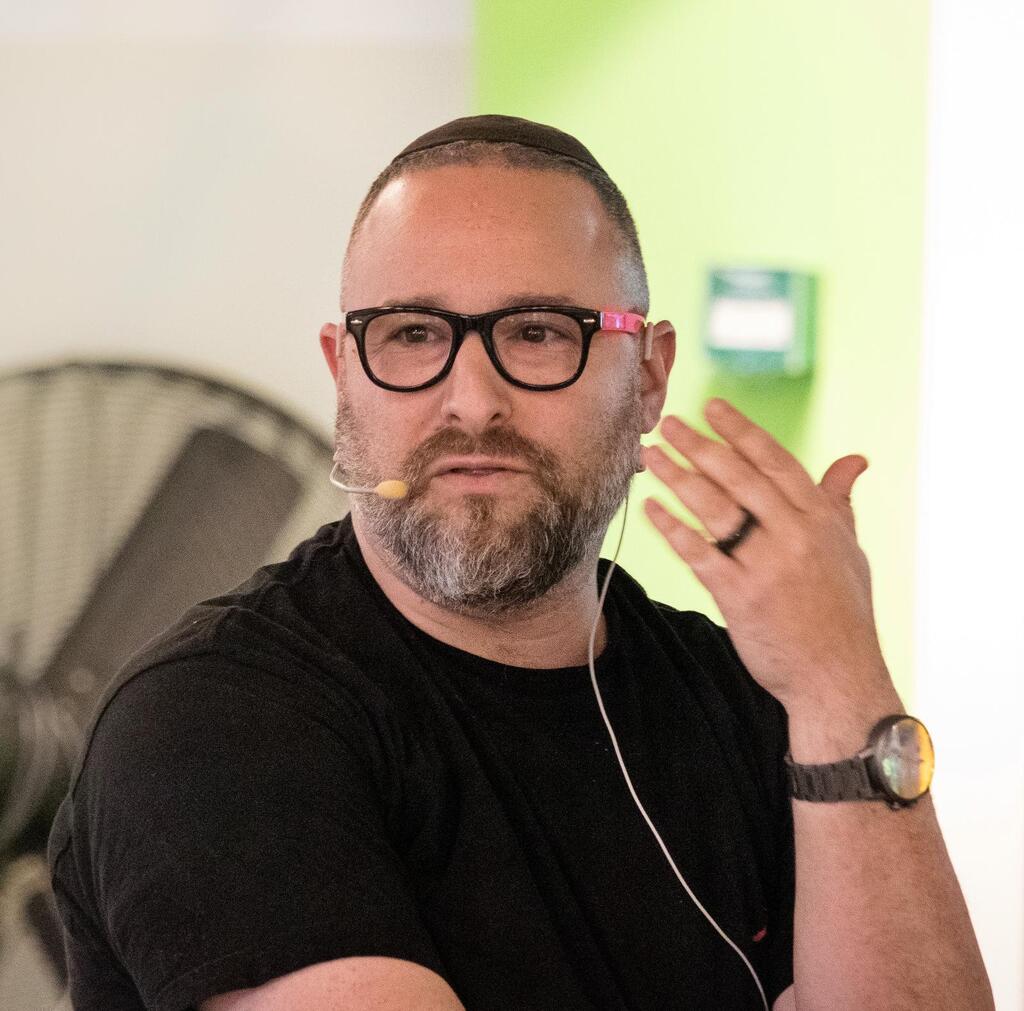Getting your Trinity Audio player ready...
It is July 2023, during the height of social tensions and hi-tech-led protests, against the Israeli government's proposed judicial reform. I am sitting opposite a very animated and confident Hillel Fuld, discussing the current political climate's effect on the startup nation.
Read more:
Finding voices who are prepared to forecast anything other than doom and gloom for the tech sector is an almost impossible feat. That’s not to say they don’t exist, they do. Lots and lots of them. But volunteering an optimistic outlook has become somewhat precarious. The startup sector is littered with cautionary tales of those who have strayed from the narrative.
Hillel is both deeply involved in the tech ecosystem as a journalist, columnist, consultant and someone who also sees more startups than anyone else in this country. As the foremost recognized English-language authority for Israel’s tech ecosystem, I was interested to understand why his opinions differ wildly from so many tech leaders today. What does Hillel know that we don’t?
I started by asking him to work backwards and provide me with an executive summary of the state of Israel’s tech sector today and forecast for me her long-term future: "Both technologically and democratically, we will be stronger than we've ever been," he says resolutely. That's because Israel's strength and innovation is, in my opinion, unshakable. Israel dominates across all sectors of technology. It used to be just cyber. Today, it's anything from healthcare to food tech, and ad tech to ed tech. Even consumer tech.
"There are several new funds launching in the near future which are currently under the radar, hundreds of millions of dollars invested in Israel. I don’t wish to belittle any fears that people might have, but I have zero doubt that we're going to be stronger than ever before. And that's kind of my high-level view.
"What I think is interesting is, when you look at this ecosystem, you can measure this using any metric you want and see how much capital is flowing into it, the quality of the capital, the unicorns, the multi-million dollar private companies and the billion dollar public companies. The multinationals that have set up shop here. No matter how you look at this ecosystem, it is something truly remarkable. And I don't think in the long term anything can stop us. Well, possibly with the exception of ourselves...”
And with that rose-tined jolly outlook, it was time to do some real interviewing. It’s one thing to exert confidence and optimism, it’s another to back it up.
“Israel will be in one year from now stronger than we've ever been. I think that's just an objective fact. I am not 99% Sure, I'm 100% sure” – Hillel Fuld
For the purpose of full disclosure, Hillel and I are friends. I am a hi-tech entrepreneur, a serial startup founder from Manchester, UK, living in central Israel for the past 15 years, and [most recently] most definitely not on the Moon!
That is to say, like so many others within the technology ecosystem in this country, from engineer all the way up to CEO, I am almost entirely engulfed the past few months in the thunderous backlash to "the reform." We all are. Some actively engaged in actions against it and some waiting on the sidelines, confused and anxious.
I fall into the latter category. And after weeks and weeks of doomsday scenarios portrayed in the evening news, it would take some digging and no small amount of convincing before I could allow myself to share Hillel’s confidence.
For the next hour, we talked about the start of the start-up nation today, the rise of artificial intelligence, venture capital, politics, the tragic murder of his brother and of course, the proposed judicial reform.
Valuations have been dropping and layoffs picking up steam. This indicates a severe downward trend in the hi-tech sector. Why the optimism?
"Because the market is correcting itself, rightfully in my opinion. For because for many, many years, maybe decades, tech valuations were completely disconnected from company revenue. A company can be worth $3 billion before they have a product. That’s a real number. I'm talking about $3 billion magically raised for a product. That’s crazy. There are many more examples of companies that we understand to be ‘successful’ are not making a dime of profit. And it has always been that.
One could once argue that valuations are based on future revenue and success and we could have that debate. But that was then. Today the markets have changed and are more in profitability. Companies today are striving for profitabliliy, the first thing they need to do is cut the headcount. So we are seeing big layoffs. There are also down rounds. It's sad to see people lose their jobs and startups struggle to raise capital, but I certainly don't believe it's a lethal blow. I think we'll be back."
I don’t think it’s a sudden lack of confidence in our ability to adapt and pivot in terms of innovating products that the world needs as we evolve as a species, but more directly to do with the venture capital lifeline which we rely on as the startup nation already beginning to become strangled in the USA. Consequently, the trickle-down to Israel’s tech sector is being stemmed. That is justifiable within itself to be extremely concerned, isn’t it?
"No. I don't agree with that premise. If you look at the actual numbers, it tells a different story. TLV Partners just raised capital to deploy in Israel, along with lots of other funds. There is money in this ecosystem. It's not drying up, as many people would have you believe. Are there challenges? Yes, 100% there are. There are going to be hiccups along the way such as the ones we are experiencing right now. But in the long term, the venture ecosystem and tech ecosystem will be fine. More than fine."
Which sectors and industries do you believe Israel should be putting on the back burner during this down cycle?
"Crypto? Web3? I know that you're a big Web3 guy Moshe, but I’m not convinced that we have really found sufficient application for that technology yet. The same for VR which realistically hasn't done anything to make our lives better [besides for kids gaming at home]. AR too has been around forever, without impacting us much. So, while I agree with you that blockchain specifically is undoubtedly here to stay and that there is no question that as a technology, it's extremely significant and impactful, but today’s applications of the tech are not sustainable. That's just my opinion."
I am beginning to regret that I asked that! Where is Israeli innovation at full speed ahead today?
"Food tech. People don't know this, but in absolute numbers, Israel's ecosystem is number two in the world after the United States for food tech. We have more food tech companies here than any other country in the world except the United States. Artificial foods, non-dairy milk products, redefined meat, etc."
What about AI [Artificial Intelligence]?
"It’s going to be huge but not necessarily as a stand-alone industry or market. It’s something I think we may have gotten off to a slow start with and trailing behind. We are not leaders in this field yet, but as a vehicle, generative AI is going to be used in significant ways in the future, enough to cause thousands of platforms to consolidate and disappear."
Should Israel not be making a concerted effort not to fall behind in AI? Prime Minister Benjamin Netanyahu was a guest on the Lex Fridman Podcast discussing this in some depth. He came across as very tuned in to AI and spoke about replicating the cyber revolution he oversaw not so long ago, this time for AI. He has been positioning himself in the room with Elon Musk and Sam Altman as a consultant regarding the creation of global standardization of AI technology. Are you confident?
"Israel needs to stay on top of tech innovation. This means having their finger on the pulse in terms of AI in general. But I'm also fine with the fact that we're not jumping on the bandwagon like the rest of the world are. I'm fine with startups that use generative AI in a real way versus becoming 'AI startups.' There are many of those who have zero value. So I'm not too worried about our positioning, as long as we stay current with our finger on the pulse, we'll be fine within generative AI."
It’s time for a break and to order an espresso. As Hillel was flagging down a waiter I took a moment to study the man. Hillel is animated and proud. He cuts a fiercely defensive figure. Israel is his country. He has excelled in building her brand for many years. I witnessed this in person just before I sat down in his favorite spot in one of a handful of coffee shops Hillel refers to as his ‘office’, he was passional selling Israel to an American businessman who had sought out his consultation.
There is no doubt that the damage to Israel’s image on the international stage is very personal for him and he obviously has no intention of being a silent spectator.
Let’s talk judicial reforms.
"You know, as a disclaimer, or I should say, disclosure, I'm not pro-reform. And I need to say that loud and clear, because I've been painting as such since I wear a kipa on my head. I am not pro-reform. I am pro a reform.
"I think the proposed reform itself needs reforming. What they did was copy-paste all of the power that the Supreme Court wields, cut it and paste it into the government's own hands. That has accomplished nothing, zero. Everyone that I asked, even the ones that are on Kaplan St. protesting weekly, all agree that we need a reform. They just don't like this reform. Why? Because it's the right-wing government’s proposed reform, which if goes through will provide Bibi with what they believe will amount to unlimited power. And they hate Bibi," he said, using Netanyahu's nickname.
"To me, that's what it's all about. If it was a left-wing government, I believe none of these things will be happening. I have personally asked hundreds of protesters, highly intelligent hi-tech minds to explain to me where the clause is which triggers a dictatorship that didn’t exist prior to [former Supreme Court chief justice] Aron Barak’s own judicial reform not so long ago. They can’t.
"At the end of the day for me, it's not a question of a judicial reform, I think it's a question of the nature of this country. What is Israel? A fully blown liberal democracy? Or is Israel a nation-state of the Jewish people? Presumably, it's been both for 75 years, but there was friction. And now that friction is coming to the surface and blowing up in the form of protests. To me, that's what this is about. And it is pure hypocrisy when several leaders of anti-reform protestors are void of any real morality. Not allegedly, Ehud Barak, who was good friends with pedophile Jeffery Epstein, talks of violent civil war in Israel in the foreign press. I mean, “show me your friends…”
Do you see anything written in law as part of the reform which you specifically see impacting the startup ecosystem in Israel?
"I think this is the literal classic textbook definition of a self-fulfilling prophecy. If we have people on the streets yelling that it's the end of the Israeli economy, and that investments will dry up and tech is going to crash, investors in America who are looking for stability, not volatility, are all listening and naturally considering pulling their money."
But why would hi-tech leaders and CEOs engage in such counterintuitive self-damaging behavior? Is it just a short-term play for political leverage?
"From my perspective, it’s about their hatred for Bibi which dominates and outshines everything, including their own country. When President [Isaac] Herzog spoke in [the U.S.] Congress and received a standing ovation for his beautiful, patriotic speech, my Twitter feed was alit with furious left-wingers, upset that their president dared to put on a brave face and display confidence. Do they not understand the concept of not hanging out your dirty laundry for the world to see and self-inflict damage to our country?
I see this a lot on LinkedIn and it is very disheartening. It used to be a sacred place of business networking which avoided socio-economic and political issues. The Ukraine war changed that somewhat with appeals for support for businesses and tech teams stuck in the firing line. But what I am seeing today from many Israeli hi-tech CEOs goes far beyond that.
"It's a controversial opinion and I am going to make a lot of people angry by saying this, but hatred blinds. I believe that they are so sickly obsessed with bringing Bibi down that there are no holds barred, there's no red lines.
"It is a self-fulfilling prophecy because American businesspeople and investors, watching CNN and reading the [New York Times], consuming reports that [Israeli Air Force] pilots are leaving the army, and that Israel's generally falling apart and bordering civil war.
"The reality is that there is more innovation than ever before. There are more unicorns than before. Claims to the contrary are just not based in reality.
"During a recent interview with Ayala Hasson, she asked me to respond to everyone's saying that investment money's going to dry up. It was so surreal because only the day before I was attending the OurCrowd summit, a conference with two plus billion dollars sitting in the room, along with our finest from Jerusalem, and Tel Aviv on Herzliya along with the very biggest names in tech from the entire world.
"Ironically, TLV Partners, who were so vocal about the dangers to the economy resulting from the reform, raised $250 million bang in the middle of the protests. Absurd."
A personal tragedy
Capital investment aside, what about the internal damage that is being caused by the proposed reform on a social and economic level? You are a religious personality who is a leader in the tech space. How does the future look for Hillel Fuld?
"All of my friends are left-wing. And I have the utmost respect and tolerance for secular ways of living. But I cannot tolerate hypocrisy. Please don't tell me that you're fighting for democracy when in 2005, 10,000 people were forcefully removed from their homes, and kids who peacefully protested were thrown in jail for days when that was met with silence and acceptance. That version of ‘democracy’ was ok?
8 View gallery


Thousands rally against the disengagement from the Gaza Strip
(Photo: Haim Horenstein)
"I have friends of over a decade, who have stopped talking to me, and I think that's really sad, ironic and hypocritical. The very people that are supposed to be pluralistic, open-minded and liberal are the very people who are not willing to listen to anyone who has differing opinions than them. I'm happy to debate with anyone.
"My brother was tragically murdered and I'm willing to sit with any Palestinian and have a debate about the wider conflict. But serious people in the hi-tech sector which I have been friends with for many, many years, didn't like this interview or that social media post and stopped talking to me suddenly. You cannot begin to imagine the heat I received post the interview with Ayalah Hasson. It's actually worse than people just not talking to me, it's also people trying to really harm me professionally. Successfully in some cases. They have really caused damage to me both personally and professionally."
We take a breath for another espresso and for Hillel to catch his breath. He needs to, it’s been breakneck speed so far, but that’s normal for Hillel at the best of days.
The truth is, that at this juncture I am a bit nervous for him. The more I chat with him the more I found myself wondering why would put it all on the line and talk to me so openly about his political opinions in ways that for the first time clash so strongly with his professional life. The price to pay seems unreasonably heavy. We were already into deep waters and I offered Hillel to stay on topic without delving into politics. He was having none of it. Hillel Fuld had come to speak his mind.
He passionately recounts the story of Tali Hatuel, an eight-month-pregnant woman, driving on her way to vote in the Likud internal party debate, then led by Ariel Sharon, regarding the disengagement of the Gaza Strip from its Jewish communities. She was critically injured by a Palestinian terrorist who opened fire from behind the cover of structures on the side of the road. The terrorist then closed in on the poor woman and her children in the back of the car and murdered them all at close range and in cold blood.
8 View gallery
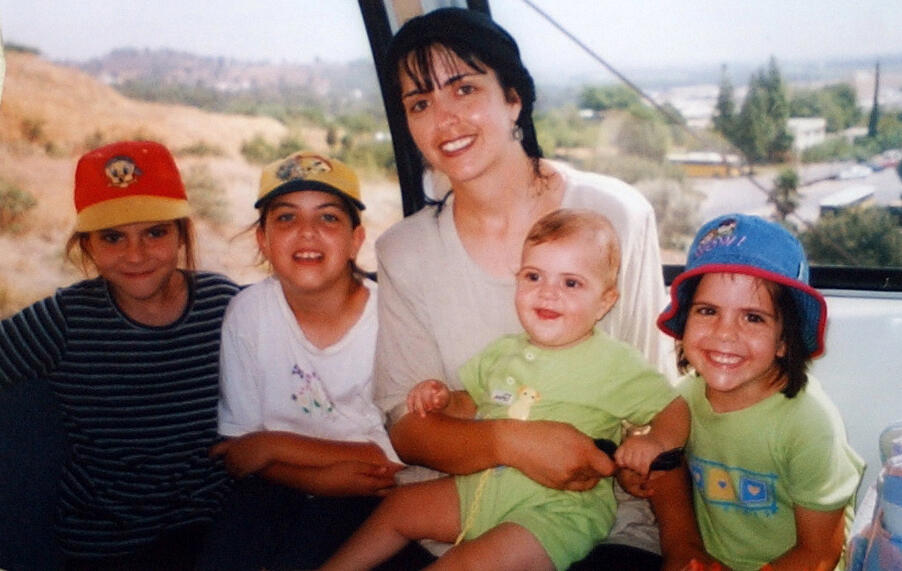

Tali Hatuel and her four daughters who were murdered by a Gaza terrorist
(Photo: Gadi Kabalo)
Two years earlier, the IDF had announced that these same structures on the side of this road were being used by terrorists to fire on Israeli drivers and needed to be demolished immediately as a matter of life and death. The government greenlighted the demolition but was met with appeals by Palestinian left-wing organizations to the Supreme Court on humanitarian grounds. The Supreme Court accepted the appeal and vetoed the demolition. A subsequent IDF recommendation and government approval a year later was also vetoed in the same manner. A year after that, it was too late.
I don’t know this story personally, but I am acutely aware that our conversation is getting very close to home for Hillel Fuld. Again, I offered to press pause and continue off record. I wanted to ask about his brother Ari Fuld who was tragically murdered by a Palestinian terrorist in 2018. Few voices on the ground could ever reflect the reality of Israel’s existence than Ari Fuld. And like his brother, the camera and keyboard were Ari’s strongest weapons. More so even than the assault rifle characteristically slung across his back which he used to save the lives of others on that fateful day.
Ari Fuld was a giant and a modern-day Jewish hero who sacrificed his own life for his country. His passing is still felt every day by hundreds of thousands who had been touched by his kindness, strength and unwavering love for the Land of Israel.
One could be forgiven for assuming that even Hillel’s extraordinary optimism for Israel’s future would have taken an irreversible hit. With the tape still rolling, I asked him if it had.
For the first time in just under an hour, Hillel took some long moments to consider before answering.
"I wouldn't call describe it as that necessarily. I think that the illusion, the fantasy of living in peace with the Palestinians, is exactly that. I think it's an absolute fantasy. And I think anybody who has a brain and can objectively see that until one of their leaders gets up and declares that Israel has a right to exist, we can’t even begin to have that conversation.
"It’s not the murder of my brother which caused me to believe that, but it certainly might have amplified my conviction. Here was a 16-year-old Palestinian kid living an unquestionably affluent life in a beautiful home in Jerusalem and under no occupation, who randomly walks over to a guy in the street and stabs him in the main artery of his neck and kills him. A father to children, someone's husband. That is indoctrination. That's not being oppressed. So again, I don't think his murder caused me to believe what I know, I think it just amplified it."
What is the message you would like to convey today?
"It's sad and ironic, that there are real people in Silicon Valley and closer to home, who are investing billions of dollars into Israeli companies with one hand, while using the other hand to simultaneously tweet out the most horrible, horrific lies about Israel. Perhaps only subconsciously, but they believe there are two Israels. The Israel that is changing the world through innovation, and the Israel which is willingly murdering innocent Palestinians.
And so, the narrative I try to create online is; just stop it. There's no two Israels. There is only one Israel. An unbelievable, miraculous country of historic proportions. As someone who came from New York, I feel blessed every day to be living in this country. And if I can give the world a window or a door into those amazing people, using technology to better industries that are begging for disruption and improve people's lives, then I have won."
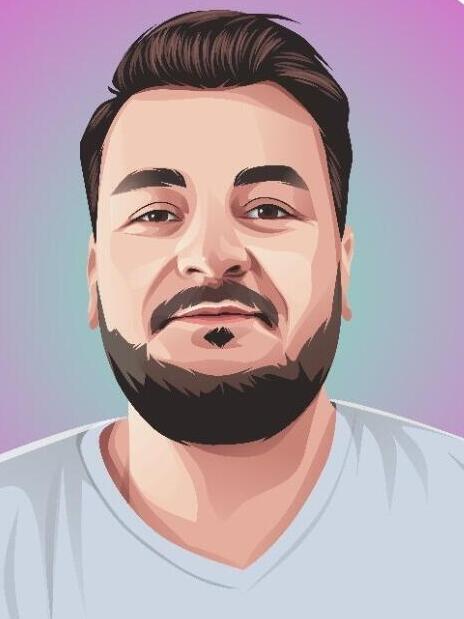 Moshe David Rubinstein
Moshe David Rubinstein 


